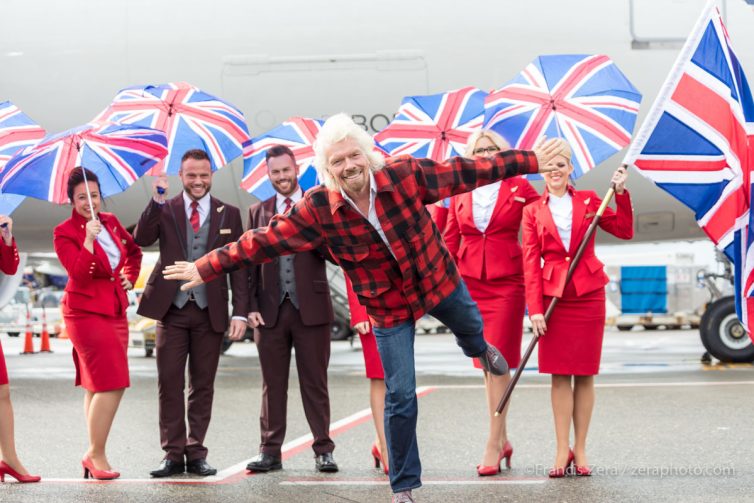
Sir Richard Branson inaugurated Virgin Atlantic service to Seattle in his inimitable style
On the heels of Alaska Airlines’ announcement that it will soon do away with the Virgin America brand, after having purchased the airline last year to the tune of $2.6 billion, Virgin Atlantic inaugurated daily service from London to Seattle on March 27.
- Virgin Atlantic’s daily service from London to Seattle will make use of the airline’s fleet of Boeing 787-9 aircraft.
Branson had publicly opposed the merger, but as a minority shareholder of Virgin America, there wasn’t much he could do. The new route will allow the Virgin brand to retain a presence in the Pacific Northwest, and perhaps help to restore a bit of Branson’s entrepreneurial dignity. The route had been announced last year, not long after news first broke about the sale of Virgin America to Alaska Airlines.
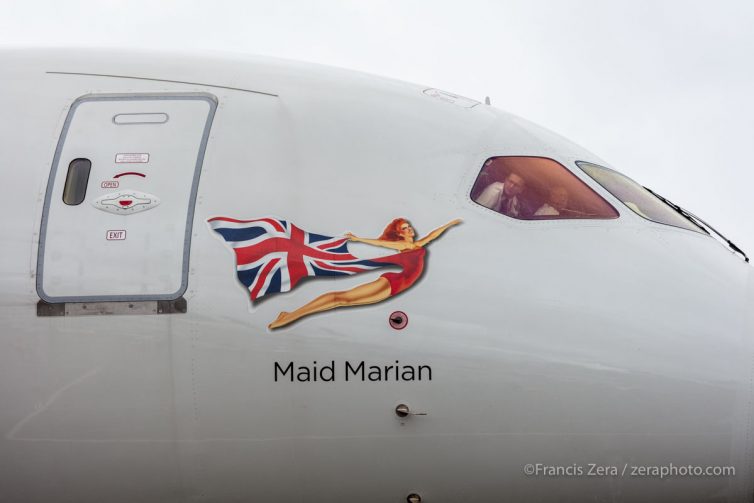
The flight crew watches the event unfold on the ramp after arrival
The new Virgin Atlantic flight replaces Delta’s daily Seattle-London service, and is the result of a joint venture between the two airlines that will add seating capacity to the route, along with what one would expect will be a more enjoyable flight experience. Virgin Atlantic’s 787-9 can accommodate about 60 more passengers than the Delta 767-300ER it replaced, which serves to increase the overall route capacity by about 40,000 seats per year, according to data provided by the airline.
In a simultaneous announcement, Delta said it will use that 767 to launch seasonal service from Portland, Ore., to London beginning May 26, offering what will be Portland’s first and only flight to the U.K.
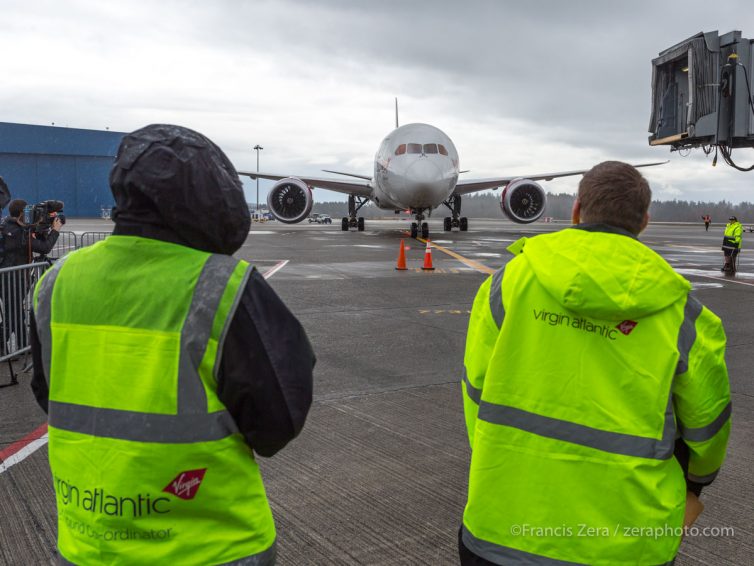
The March 27 flight was somewhat ceremonial; the actual first flight happened the day before
At a post-landing press conference, Branson commented on the end of the Virgin America brand saying, ’œI genuinely believed they would treasure the brand, treasure the people, treasure the product,’ he said, referring to Alaska Airlines. “The last thing they would do would be to rip the heart out of it, which seems like what they are going to do.’
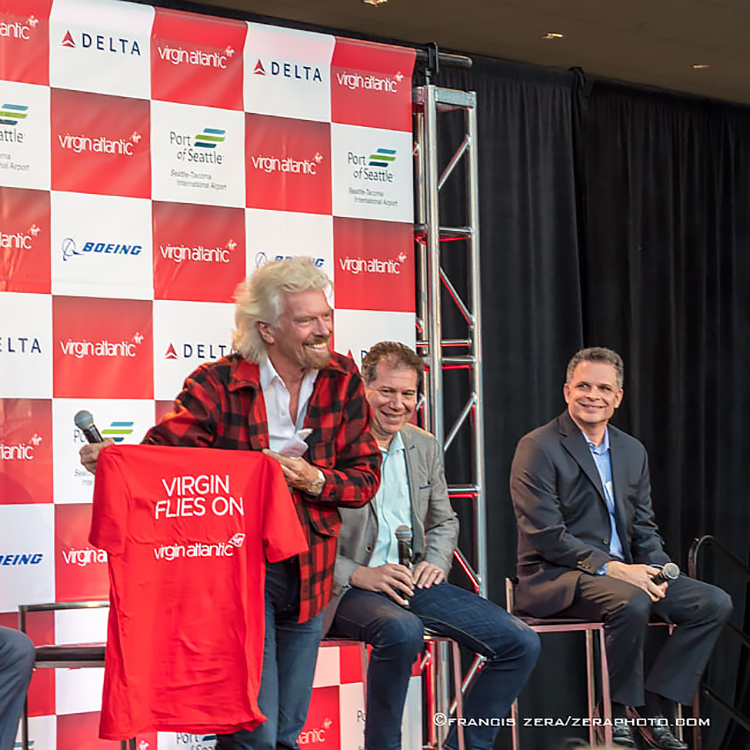
Branson took the opportunity to fire off several digs at Alaska Airlines for its recent announcement that it plans to scrap the Virgin America brand by 2019
Further lamenting the demise of his carefully-constructed Virgin America brand, Branson said, “I just wonder what it was that Alaska bought. Why did they bother?”
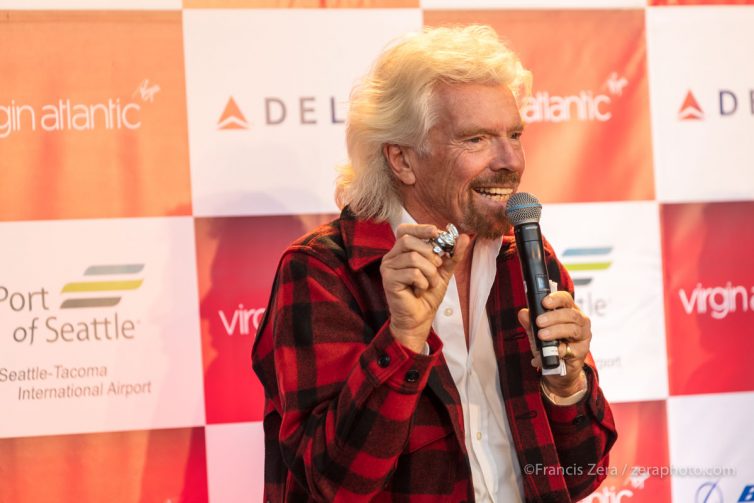
Branson recounted the story of how the salt-and-pepper shakers from Virgin Atlantic’s first-class service turned into a solid bit of marketing for the airline
Carrying on with a marketing story, Branson shared an anecdote exemplifying how he handles the marketing of his airlines. The airplane-shaped salt and pepper shakers “they also kind of look like little sheep,” he said that are used in the premium cabin are often stolen by passengers.
“My accountant called me up and told me we were spending $2.5 million a year on them, and asked what I wanted to do about it,” he said. Instead of simply switching to something cheaper, he had the idea of stamping “Pinched from Virgin Atlantic” stamped on the bottom of each one. “They’ve become some of our best advertising,” he said, adding that they can be found on dinner tables across London.
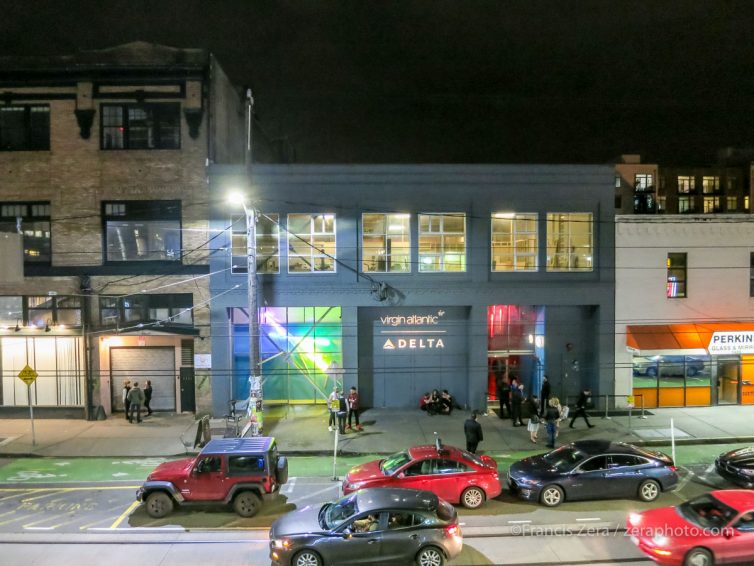
An invitation-only party was held at a Seattle nightclub the evening after the inaugural flight event.
A friend who’s worked in aviation for decades once told me that nobody knows how to throw a party like Virgin does, and, true to form, the service rollout was a very festive affair. A private party was held the following night at a nightclub in Seattle, and Branson’s comments at that party were much more restrained and on-message. But it was indeed a heck of a party, with a live performance by English singer Raye (who sang a song that she composed on the flight to Seattle), a DJ, and a very energetic dance act.
Welcome to Seattle, Virgin Atlantic!
Comments are closed here.
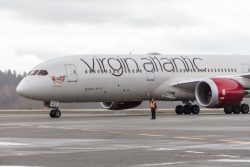
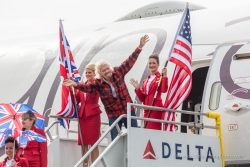
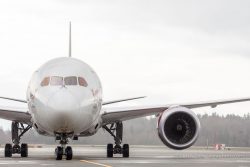
Poor SRB, his foreign business experiment that was barely profitable decided to sell itself and all he got was a measly $600M. Yet, he trashes AS for not keeping this wonderous thing he created and not understanding what they bought VX for. As a billionaire who’s founded numerous airlines across the globe, you’d think he understood how airlines work…
You think he needs 600mm? He is worth $4.9 billion. $4,900,000,000. 600,000,000 is a lot, but not to him. He has more than enough money, they are killing his passionate work.
Of course he doesn’t need the money, but he’s whining like it *cost* him $600M…
Sir Richard needs a haircut!
Edgar, personally I do not get what Alaska bought either. The main asset of an airline is its fleet, but Alaska seems to plan to get rid of the Airbuses. Most of the Virgin Crew will need retraining, as I doubt they are qualified on the 737. As an article on this site said, by buying Virgin, Alaska was buying itself. Personally, all I think Alaska did was get rid of competition, and expand in SFO.
Most of Virgin America’s fleet was leased, and the orders for A320/1 aircraft can easily be sold/transferred to Jet Blue which is growing as well. This merger will grow AS route map and landing slots at airports that are key to its growth.
What AS needs to do, is follow Virgin and Jet Blue and create a better First product on its trans-con routes. Sure that limits the ability to swap any plane on any route, it does allow them to compete on some key routes.
AS bought VX to expand in California and to better compete with US3+WN. They’re keeping the Airbuses for now and probably for another 8 years. Nowhere have they stated they’re going to stick with an all-Boeing fleet. As far as eliminating a competitor, VX was hardly on AS’ radar. Their route structure barely overlapped, but the threat of DL in SEA forced them to expand beyond what they could do organically.
WHY are you giving this blowhard any air time? Never mind he got $600M and $22M every year in “licensing fees”. Had he been so concerned he could have gone to HIS major shareholder Delta (49%) and got them to pick up VX, no problem there with foreign ownership. He may have and I guess we know what the crew in ATL to say about that.